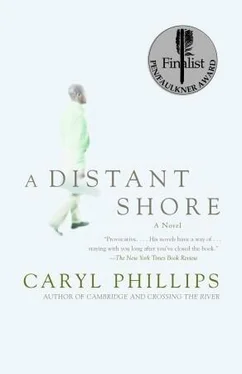Miss Mitchell coughs. And then she speaks.
“The charges are that you have repeatedly left Mr. Waverley notes in his box. That you called his wife and, on behalf of all teachers at this school, expressed concern over his mental and physical health. That you have visited his lodgings and left him abusive mail. And that just last night while he was having dinner with his sister, you stood outside the restaurant window and stared at them both. All of these transgressions have contributed to a climate in which Mr. Waverley feels he can no longer carry out his work here, and he has asked Mr. Jowett to relieve him of his duties.” Miss Mitchell’s speech is over and she leans back in her chair. But then she remembers one other thing. “If you have anything to say, I think that now would probably be the time to say it.”
She looks at this woman, then at the benevolent, avuncular figure of Raymond Jowett. Do they seriously believe that a fifty-five-year-old divorcee can terrorise a forty-year-old grown man? She begins to laugh. Mr. Jowett sighs.
“I’m afraid this is no laughing matter. These days there are laws and guidelines that protect the individual’s right to peaceful coexistence with colleagues in the workplace. Unless you categorically tell me that you did not leave inappropriate messages either at his home or in his pigeonhole; that you did not call Mr. Waverley’s wife; that you did not stalk him last night, then I’m afraid I will have to suspend you from your duties for two weeks while we take statements from all parties concerned, including colleagues of yours with whom you work closely. I’m afraid it’s the law.” She shakes her head in disbelief.
“Are you serious? This has to be a joke.” But nobody is laughing. Miss Mitchell stands up. She turns to her superior.
“Mr. Jowett, if I may.” Mr. Jowett nods surreptitiously, but with sadness. Miss Mitchell turns to face her. “You have a copy of the code. Either myself, or somebody from the district office, will be in touch regarding your interview. This should take place in the next ten days or so. As of now, as the head says, you should consider yourself on a two-week leave with full pay. This will, of course, be kept strictly confidential.”
She looks from the upright Miss Mitchell to Mr. Jowett, but he merely nods in helpless agreement. She gets to her feet.
In the evening she calls her sister in London. Sheila is surprised to hear from her, and she knows immediately that something is the matter.
“Nothing,” she says. “I just thought that I’d come and see you, if that’s all right.” There is a short pause. She knows that Sheila is trying to decide whether it is best to have the discussion now, or save it until they are together, for she knows that her impatient sister does not like to be lied to.
“What time are you arriving?”
“I haven’t checked on the buses yet, but I’ll call you from the station tomorrow.” Again there is a short pause, and then Sheila remembers her manners.
“Good. It’s been too long.”
“Yes, it has.” After she has spoken with Sheila she pours herself a glass of white wine. Then she sits at the piano, her fingers resting lightly on the keys, but she cannot summon the energy to disrupt the silence. Instead she stares at the score, and sees small anecdotes and exclamation points of advice that over the years she has scratched in the margins. It would appear that back then she was afraid of nothing, for difficult passages are circled in a manner which suggests that one should be aware of the upcoming problem but tackle it nonetheless. But this evening she cannot find it within herself to do anything other than lightly brush the keys with the tips of her fingers.
She wakes early the next morning. The sky is still dark, but she knows that the day will soon arrive. She sits in bed and brushes her hair with idle strokes, transforming her grey locks into a flowing tail. Then, once she sees the first rays of dawn, she gets up and showers and then dresses herself with quiet anxiety coursing through her veins. She has made no preparations. There is no booked seat, no bag standing by the door. She has not cleaned the house, or cancelled the milk. Nothing. It is all very unlike her and it serves to remind her of how unsure she is about what she is doing. She locks the door and steps out into the street as daylight begins to brighten the sky. As she walks to the bus stop she notices that the bold circular disc of the moon is still visible, which leads her to wonder whether night has lingered too long or morning arrived too soon. Once she reaches the main bus station she buys a return ticket on the first coach to London, and then she calls Sheila and tells her what time she will be arriving. Sheila is still asleep, she can hear it in her voice, but her sister tries to pretend otherwise. She buys a copy of the Daily Mail , plus a couple of women’s magazines, and then she boards the coach and finds a seat behind the driver and close to the front. There are still twenty minutes to go before the scheduled departure time, but her efforts to settle in are undermined by the driver’s conversation with a young man who stands by the door to the bus clutching his bicycle. He wants to put the bike in the luggage space underneath the coach, but the driver is pointing out to him that unless the bike folds up flat, then this cannot happen. Soon the young man is shouting at the driver, then cursing him in foul language. The driver looks at the abusive youngster, who could be his son, with a look of sad bemusement etched on his face. The young man continues to jab his finger in the driver’s direction and bellow at the top of his lungs. She looks away, ashamed and puzzled. It is one thing to be frustrated by rules, but it is another thing to flout authority in such a vulgar manner. These are not happy times for anybody.
About halfway to London they stop at a motorway service station. She has been sleeping, and as she opens her eyes she finds herself peering out at the bleak scene of unappetising fast-food places, an RAC stand, rows of unused telephones and neon-lit petrol pumps. Most choose to leave the coach, but she decides to stay on board. It is only a fifteen-minute stop, and if she needs the bathroom then there’s one on the coach. The man across the aisle begins to make a performance out of loudly munching an apple, and then salting a hard-boiled egg and taking a bite, before switching back to the apple. She looks away in dismay, and then thinks of Sheila, who could never live up to her big sister’s exam results. In fact, she fell comfortably beneath them and eventually took off for London where she found work as a secretary in a law firm. Within six months, she had met Roger who, having finished his time as a trainee in music and arts at the BBC, was now dipping his toes into the world of documentary film-making. Whenever she and Brian would travel to London from Birmingham, either to attend a play or a concert, or on one of Brian’s business trips, they would generally take Sheila and Roger out for a meal. Then, as Roger’s career began to flourish, the young couple moved into a flat of their own in Maida Vale that was in the middle of a bland neighbourhood of crushing respectability whose tedious streets neither gained nor changed character. It all seemed so unlike Sheila, but she thought it best to say nothing to her sister. On a few occasions, Sheila and Roger had them round and insisted on cooking for them, although Brian usually objected to this as he claimed that vegetarian food made him sick. However, never once did Sheila mention marriage, or, more puzzlingly, children. When she got the letter from her sister announcing her split with Roger (who was by now winning awards for his documentary films) and informing her that Sheila was now setting up home with a Maria Kingston “across the river,” she was shocked. After twenty-five years with a man, her sister was only now discovering that she wanted to be with a woman? Brian smirked, and then began to laugh. He claimed that he had always had his suspicions.
Читать дальше











![Карен Кингсбери - A Distant Shore [calibre]](/books/384306/karen-kingsberi-a-distant-shore-calibre-thumb.webp)
